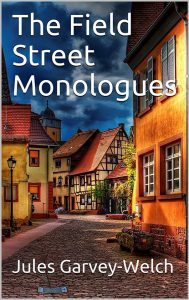William Sutton's Blog, page 14
July 16, 2018
CrimeFest #4 – Simenon & Banville, Simenon fils & Benjamin Black
Top moments from CrimeFest 2018: JOHN BANVILLE & JOHN SIMENON interviewed by Maxim Jakubowski.
On genre
“I wish we could get rid of the notion of genre. There’s good writing, and writing that’s not good. Nothing else counts.” John Banville
On inspirations:
“He always said he was like a sponge. There are myriad autobiographical aspects in the novels.” John Simenon
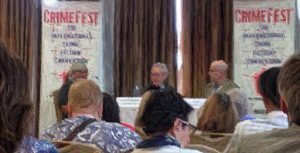
On great writers:
“I will take one Simenon book for ten Camus or ten Sartres. He can create a world in two lines. Les Romans Durs are masterpieces in any genre. …Simenon is one of the great literary novelists of the twentieth century.” JB
On adjectives:
They raised and more or less confirmed the legend that Simenon would hold up the draft of the book, shake it, and declare he was “throwing away the adjectives”. JB
On planning:
“I used to plan. Now I write by instinct.” JB

On trying to translate Simenon:
“It’s like trying to translate water into oil.” JB
On characters:
“When I hear writers say, ‘The characters took over,’ I think they’re idiots or incompetent. Characters are made from words. We’re cannibales. We consume little bits of people. It’s a difficult job, but fun.” JB
On crime writing:
“My ambition is to write a crime novel without a crime.” JB
See you at next year’s CrimeFest.

Please Feel Free to Share:









July 14, 2018
If you enjoyed the gig, tell them
It’s a treat when people mention that they’re reading the books.
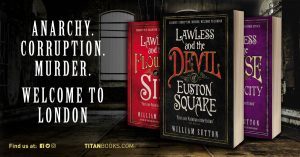
At Holmes Fest 2018, an audience member told me they’ve just finished Flowers of Sin.
A friend at school has 90 pages to go in House of Electricity, enjoying it most of the three.
Last week at Petfringe last night, someone mentioned they’ve finished all three.
My friend is listening to the audio book, which is brave, as it’s 13 hours long, and RNIB just got in touch about recording the second book.
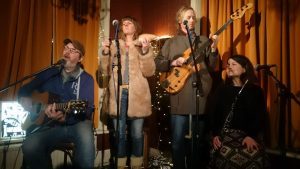
I used to be too shy to tell authors and musicians when I loved their work. I’ve got over it now. You will frequently see me, after a gig or a show, hanging around near the stage, just to let the performers know how much I’ve enjoyed it. There are shows that I’ve enjoyed so much, it would be worthwhile doing it just for me.
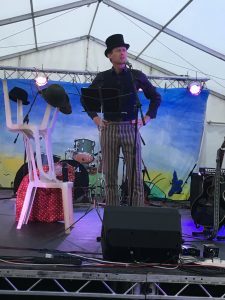
The author showing off his trousers at Haslemere Fringe
Please Feel Free to Share:









July 12, 2018
“Every ad tells a story”: Victorian Font research
Every ad tells a story.
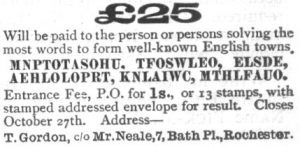
Research leads down mysterious alleys. Working on Lawless and the Clerkenwell Clockmaker with artist George Cochrane, I was just collecting a few Victorian fonts. Thus I stumbled again on the wonderful research of Beatrice Ashton-Lelliott, PhD researcher at University of Portsmouth studying nineteenth-century magicians in literature, and the press.
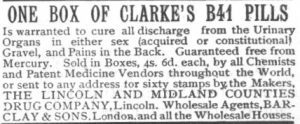
Through her, I stumbled on the British Library’s In the Spotlight playbills project, where the fonts curve and dazzle. (Harvey’s Midges get a brief mention in Flowers of Sin.)
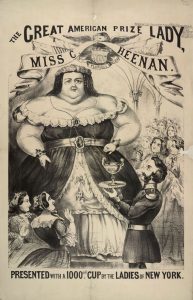
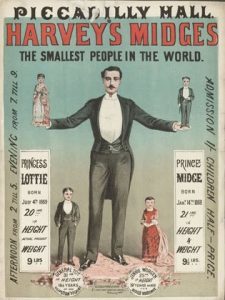
And back to old faithful VICTORIANLONDON.ORG, Lee Jackson unparalleled resource for the novelist and historian. I might have used these in my third novel, House of Electricity:

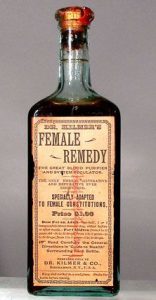
And this may sneak into the next, Lawless and the Crock of Gold:
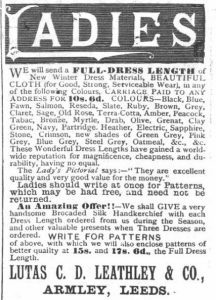
While this ought to feature in my academic paper for Asylum Steampunk conference in Lincoln in August:
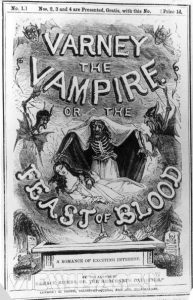
But every Victorian ad article ought to end with this:
Dr Batty’s Asthma Cigarettes For the temporary relief of paroxysms. Not recommended for children under 6
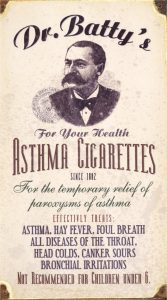
Please Feel Free to Share:









June 8, 2018
Talking tapes, how I love thee
The individual prices seems steep, but make more sense if you go for the Audible deal at £7.99/month. Choose from the world’s largest selection. Cancel anytime. You can pause your membership too, when you’ve got a few credits stacked up.
Here’s Lawless and the Devil of Euston Square audiobook. You can read about the fun I had recording it here.
Please Feel Free to Share:









June 1, 2018
Neuropsychopharmacological cracks in everything: That’s How the Light Gets In #HTLGI18
Ring the bells that still can ring
Forget your perfect offering
There is a crack, a crack in everything
That’s how the light gets in.
[Leonard Cohen, Anthem]
We loved the How The Light Gets In Festival at the weekend: swearing and equality, womping and psychedelics. Camille O’Sullivan drew all the strands together by singing Cohen’s Anthem, amongst her various poetical balladeer inspirations; and the audience sang along “…a crack in everything / That’s how the light gets in.”
Seemed apt amongst the showers and lightning; seemed apt amongst the philosophy and politics.
Our other musical highlights were the ethereal Bloom de Wilde and her later wilder incarnation with Sam and the Womp‘s romping Balkan tunes in the Globe Hall, which made our “heart go Bom-Bom”.
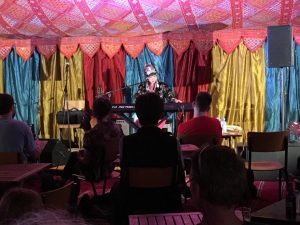
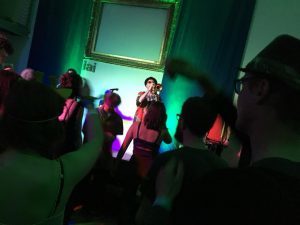
Bloom de Wilde, Sam and the Womp (photos: Caroline Sutton)
Camille O’Sullivan‘s wild tour of great songsmiths made a good prelude for my playing bass along to Philip Jeays‘ melancholic malevolence in his pungent poignant set on Sunday eve.


Camille O’Sullivan, Philip Jeays
Talking highlights: Professor David Nutt‘s no-nonsense neuropsychopharmacology was authoritative and persuasive. The suppression of research is shocking, especially given the impressive impact of psychedelics on mental health and addiction treatments.
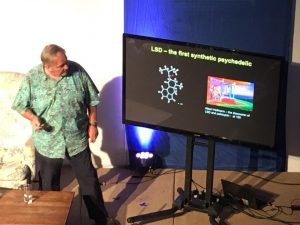
David Nutt
‘s neuropsychopharmacology
Rebecca Roache on swearing was funny and enlightening. And it’s just a pleasure to walk around the fields and tents, however muddy, seeing Diane Abbott and Jess Phillips attending talks just like the rest of us.
So much on that we couldn’t get to (Noam Chomsky video link, Fyfe Dangerfield, Tankus the Henge, Ana Matronic), not to mention the other festival at the end of town. Yes, the camping was muddy; yes, some of the comedians’ shows are works in progress.
But all these talks and shows shared something bright, a subtle intelligence inclined to entertain and inform. Sufficient to say that, though visiting Hay-on-Wye, I entered no bookshop all weekend.
Please Feel Free to Share:









May 30, 2018
Short Story Competitions
I’ve been teaching short story writing this year, so here are three competitions worth entering.
Bridport Prize
Quick for deadline tomorrow.
SHORT STORY PRIZE 1st Prize £5,000 2nd Prize £1,000 3rd Prize £500
FLASH FICTION PRIZE 1st Prize £1,000 2nd Prize £500 3rd Prize £250
Short Story and Flash Fiction Judge 2018: Monica Ali
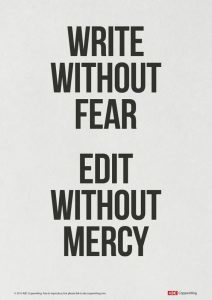
V.S. Pritchett Short Story Prize
Royal Literary Society:
Closing date for entries Friday 29 June 2018 at midnight.
2000-4000 words.
Quite strict guidelines, clearly laid out.
https://rsliterature.org/2018/03/v-s-pritchett-short-story-prize-2018/ …
The Dorothy Dunnett Prize
And finally, from the Historical Writers Association, the Dorothy Dunnett Prize:
£500, publication in Whispering Gallery and on www.historiamag.com (for whom I’ve written a number of articles), mentoring session from author & agent, and tickets to HWA Crowns Ceremony in London, November.
2 Highly Commended entries also receive mentoring.
DEADLINE: 31st August
3500 words.
Set least 35 years in the past.
Please Feel Free to Share:









May 23, 2018
CrimeFest 2018 – Bloody Scotland
Top moments from CrimeFest 2018 panellists.
The Bloody Scotland Panel riffed on Anglo-Scot distance, Anglo-Europe harmony, Edinburgh-Glasgow enmity, darkness v humour, class discord, teetotal v drunkenness, dark humour; and Danish sperm. Entertainingly moderated by Michael J Malone, it showcased off the talents of Caro Ramsay, Douglas Lindsay, Lesley Kelly, and Tana Collins: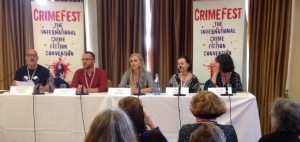
On Tartan Noir phenomenon:
“Caledonian Antisyzygy,” declared Michael J Malone to general astonishment. (He was quoting Wikipedia, as we all do.) “The term refers to the ‘idea of dueling polarities within one entity’, thought of as typical for the Scottish psyche and literature.”
On inspirations: “The great thing about Scotland is everybody wants to leave it.”
On research: “Most donor sperm in Scotland comes from Denmark. So Scots will get taller and handsomer…”
On geography: “Much of Scotland is closer to Scandinavia than to London.”
On conflict:
“The notion of Caledonian Antisyzygy is most frequently cited in reference to the seemingly morally contradictory quality of the works of Robert Louis Stevenson (Strange Case of Dr Jekyll and Mr Hyde) and James Hogg (The Private Memoirs and Confessions of a Justified Sinner), but is also applied to contrasts between the Highlands and the Lowlands, Protestantism and Catholicism, Britishness and Scottishness, and others.”
“i.e. we’re schizophrenic.”
“And that’s a good thing?”
See you at next year’s CrimeFest.
Please Feel Free to Share:









Four Stars for Field Street Monologues
Four Star Review of Jules Garvey-Welch’s Field Street Monologues by Lois Zoppi on Broadway Baby website.
“What happens behind closed doors? How much do you really know about your neighbours? Is that knowledge you’re better left without? The Field Street Monologues consists of six monologues exploring exactly those things. We meet a young man embarking on his first dating in the dark experience, a clown recounting the lifelong escalation of hatred for his mother, a businessman mourning the loss of a very close friend. Just along the road there is a theatre costumier gossiping about the cast of divas backstage, a naive bachelor finding love on the internet and a wife with murder – and whelks – in mind. We peek behind each door on a Black Country street and delve into a neighbourhood full of unique, intriguing stories.”
As part of the show, I sang Philip Jeays’ The Knife, my own Portsmouth Fairy Tales song, The Ghost of Sherlock Holmes (rediscovered by Matt Parsons and Janet Ayers) and the brand new Eliza Cartwright ballad, cowritten with playwright Jules Garvey-Welch. With shows at Titchfield Festival Theatre, Southwick Church and Brighton Fringe, this show should run and run. Entertaining, poignant, wry, provocative.
Look out for Jules Garvey-Welch in theatres and on radio in future.
Please Feel Free to Share:









Four Star Review of Jules Garvey-Welch’s Field Street Mon...
Four Star Review of Jules Garvey-Welch’s Field Street Monologues by Lois Zoppi on Broadway Baby website.
“What happens behind closed doors? How much do you really know about your neighbours? Is that knowledge you’re better left without? The Field Street Monologues consists of six monologues exploring exactly those things. We meet a young man embarking on his first dating in the dark experience, a clown recounting the lifelong escalation of hatred for his mother, a businessman mourning the loss of a very close friend. Just along the road there is a theatre costumier gossiping about the cast of divas backstage, a naive bachelor finding love on the internet and a wife with murder – and whelks – in mind. We peek behind each door on a Black Country street and delve into a neighbourhood full of unique, intriguing stories.”
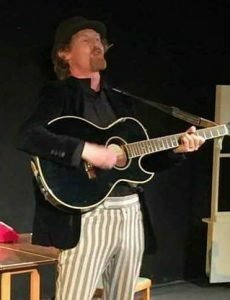
As part of the show, I sang Philip Jeays’ The Knife, my own Portsmouth Fairy Tales song, The Ghost of Sherlock Holmes (rediscovered by Matt Parsons and Janet Ayers) and the brand new Eliza Cartwright ballad, cowritten with playwright Jules Garvey-Welch. With shows at Titchfield Festival Theatre, Southwick Church and Brighton Fringe, the show should .
Please Feel Free to Share:









May 16, 2018
Crime Fest Lessons #4
I enjoyed last year’s panels and interviews. And I took notes. Thus I here offer for your delectation my 20 top tips and observations from CrimeFest 2017 panellists.
See you at this year’s CrimeFest.

These from a sparkling Doyle-Christie panel, When Your Character is a Classic, with Alison Joseph, David Stuart Davies, Cavan Scott and Andrew Wilson, moderated by Peter Guttridge:
On copyright:
“Characters can be copyrights, but there are no legal issues in using real people.”
On invitations:
“Agatha Christie was invited to speak at the Sherlock Society in 1959. She stood up, waved, and sat down again.”
On studying:
Back in the day, David Stuart Davies remembers being told “Conan Doyle is not important enough for a PhD.”
On appropriation:
Dame Jean Conan Doyle said to DSD “You’re a very naughty boy. You should find your own characters.”
On appropriacy:
“We want to be true to the spirit and detail of the novels. If Conan Doyle were alive today, he would be writing differently.”
On our misapprehensions of Sherlock:
“Holmes threw back his head and laughed.”
Please Feel Free to Share:










